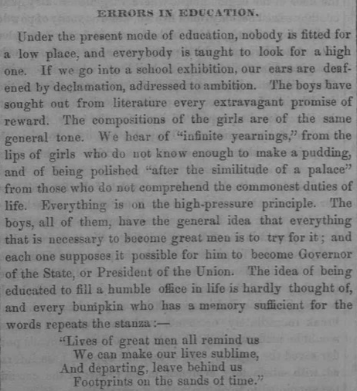“Nobody is fitted for a low place, and everybody is taught to look for a high one.”
Lavinia Goodell, January 1862
In January of 1862, twenty-two year old Lavinia Goodell wrote an article for her father’s anti-slavery newspaper the Principia titled Errors in Education.

The proposition of the piece was that all young people were encouraged to strive to achieve high office or positions of honor when in fact most people would be better served by filling humbler stations in life. Her article began:

Lavinia quoted Henry Wadsworth Longfellow, one of her favorite poets, in the piece. While she said, “There is a fine ring to the familiar quatrain of Mr. Longfellow, it is nothing more than a musical cheat. The lives of great men remind us that they have made their own memory sublime but they do not assure us at all that we can leave footprints like theirs behind us.”
Lavinia, who was an avid reader, then quoted from Timothy Titcomb’s Lessons in Life, which lamented that boys and girls are bred to discontent. (Timothy Titcomb – a name borrowed from Thackarey – was a pseudonym of Josiah Gilbert Holland, a writer who helped found Scribner’s magazine.) Lavinia agreed that:
The multitude dress beyond their means, and live beyond their necessities, to keep up a show of being what they are not. Farmers’ daughters do not love to become farmers’ wives, and even their fathers and mothers stimulate their ambition to exchange their station for one which stands higher in the world’s estimation. Humble employments are held in contempt, and humble powers are everywhere making high employment contemptible.
Lavinia suggested that, “Boys may be taught that it is better, nobler, to be an honest, upright, working farmer, and walk every year hand in hand with nature, than to hang around Washington on the advent of a new administration, begging for an office, and regulating their principles as merchants do their prices “to suit the time.” Girls, she said, “may be taught that it is far better to spend their time in churning and baking than in studying to make a show, and gratify vanity.” She urged that young people of both sexes be taught that “all this ‘practical,’ ‘common-sense,’ ‘every day life’ business is about a humble means to a high and noble end.”
Lavinia said:
That we cannot all make ourselves “Governor of the States, or President of the Union” is self-evident, and if the idea of sublimity is inseparably connected with gubernatorial honors, then indeed it is all over with most of us! Well, many do think … that to become “great” and “sublime” they must become “Governor” or “President,” and in their eagerness to attain the goal they usually out-do the matter, cross the border-line, and succeed in “making their lives” – ridiculous!
She concluded:

Read her entire piece here.
Sources consulted: “Errors in Education,” by Lavinia Goodell, published in the January 18, 1862 issue of The Principia;







